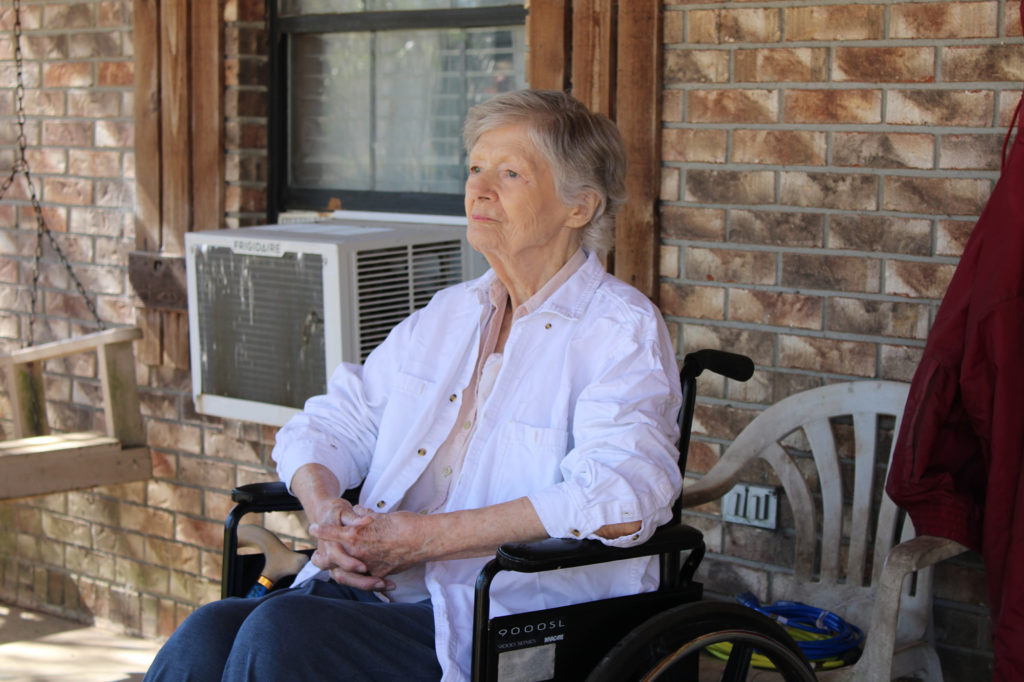
Katherine McCardle Cole knows what it’s like to witness history—twice—from the front porch of her southern Mississippi farmhouse.
That’s where the 83-year-old was when Dixie Electric Power Association first strung power lines to her home when she was a child.
And that’s where she was again in January, as a truck from the co-op’s broadband subsidiary came up the hill. Katherine, who now relies on a wheelchair, asked her son Ricky to help her get there so she could watch the crew hang fiber-optic cable.
“She says, ‘Boy, I want to see that,’” said Ricky. “She sat there and studied them awhile. Naturally, she had a couple of ideas on how they could be more efficient with their time. Then she said, ‘I am just tickled to see that going up, because it is going to help all of us.’”
Ricky, who travels from Jackson to Ovett three days a week to work the family farm, says his mom is excited for the life improvements broadband will bring—online doctor visits, good video quality for her favorite shows and enough bandwidth for her grandchildren to do their schoolwork.
“She understands the full value and benefit of internet service, and she will be an excellent consumer of it,” he said.
Katherine and her husband both have health challenges. Getting into and out of a vehicle for a doctor visit several miles away can be exhausting.
“As soon as we can subscribe for internet service through Dixie, she can sit in the living room and do an appointment with her doctor,” Ricky said. “Then my dad will have no excuse to miss his doctor appointments.”
Ricky said his mother is most excited about her grandchildren being able to stay for longer visits.
“Both have been virtual students since the pandemic began,” he said. “Now they only stay a day or two, then they have to get back to Jackson to do their schoolwork. She’s excited about the prospect of them being at the farm a lot more.”
Ricky said he’s looking forward to having access to precision agriculture applications and social media to boost sales of the farm’s produce.
“Broadband will add … quality of life and economic opportunity for our family,” he said. “I believe it will have a lasting positive impact on rural society and the rural economy and also the rural culture.”
He’s not alone. Randy Smith, general manager of Laurel, Mississippi-based Dixie Electric, says calls from members wanting broadband for education and telework started coming in long before the pandemic.
“Once COVID hit, it’s been nonstop,” he said.
With help from the federal CARES Act for COVID-19 pandemic relief, state grants and matching co-op funds, Smith said 600 households will soon have broadband service in this sparsely populated region dotted by blueberry growers, poultry operations and family farms. Another 1,800 have expressed interest in signing up.
Dixie Electric began exploring retail internet in earnest in 2019 after the state legislature clarified that electric co-ops could enter the broadband space. With board approval, two in-depth feasibility studies and strong member feedback, the co-op began building a fiber network and connected its first 112 customers in December 2020.
“The response has been overwhelmingly positive,” said Smith. “We had a couple of people tell us, ‘AT&T has been telling us in two to three years that they’re coming, and we’ve not seen them yet. In three months, you’re here.’”
Smith said being part of the history that Katherine Cole and so many other Dixie Electric members have seen is something he takes to heart.
“We’re excited about the opportunity and what it means for the members in our service area,” he said. “It’s been said a number of times, if co-ops don’t do it, then in lot of cases, it’s not going to get done. We’re excited about being part of the solution.”
Cathy Cash is a staff writer at NRECA.